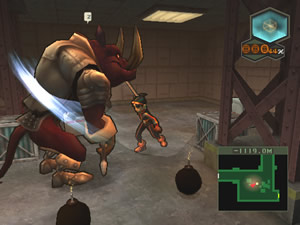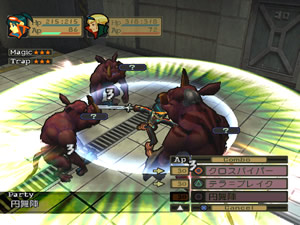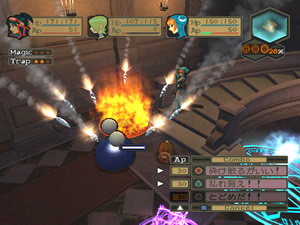We didn’t start the fire, but we’re glad someone did.
The Breath of Fire series has been quite consistent through four prior
iterations – the same ol’ meat and potatoes time and again, as when you’re successful,
there’s no real reason to change the recipe. But with its fifth entry, Breath
of Fire: Dragon Quarter, the meat and potatoes have been chucked aside in
favor of spicy reinvention, offering a hot battle system and a worthy story to
whet one’s appetite.
In a world bereft of light, civilization has been forced to live underground in a society based on a rigid caste system. The higher one’s social ranking, the higher they are allowed to live. Ryu is a lowly grunt within the government’s Ranger forces. On a seemingly routine mission, he rescues a mysterious winged girl in danger.
While
the story touches a few clichés, the settings are fresh and the characters are
interesting, all supported by effective writing. In terms of pacing, Breath
of Fire follows a linear line through an expansive dungeon with the occasional
save point. While this geography is part of the story, those of you expecting
a free-range style of villages, overworld and dungeon mazes will be disappointed.
But if you want an innovative battle system, then Breath of Fire: Dragon
Quarter is one tasty lozenge. Before battles, enemy characters are both
visible and avoidable. Various preparations can be made against the hordes of
beasts to nab a battle advantage. If you manage to strike an enemy first with
a character’s action move, such as Ryu’s sword sweep, you are given an extra
turn during battle – a key factor towards victory.
By tossing a juicy rib-eye steak in the corner, you can bait some monsters
away, clearing a path to run through. Or by chucking a few sticks of dynamite
at a big lug, you can knock off some enemy health before the real battle begins.
It’s a great way to give players an edge before hopping into battle after battle.
The turn-based battles themselves are like a combination of Arc
the Lad movement and Xenosaga combos. The combat
environments structurally match the standard traveling screens, only from a
top-down perspective. I think there should have been a selectable ground-based
view, so the transitions into battle would be completely seamless. The view
only switches into ground level when your characters attack.
Each character begins with a limited number of points to be spent on moving and attacking. The more powerful the move, the more points it will cost: 10, 20 or 30. By finding a choice attack spot, enough points can be retained to follow through with a combo attack.
The angle at which you approach the enemy doesn’t seem critical to the damage made, but placement strategy plays a large part on the defensive end. Instead of spending all your points wailing away at a monster, some points can be conserved towards moving to a safe distance after your attack. There are also attacks that implement setting up trap zones and coaxing/pushing enemies in.
Characters can use as many items as needed during combat without spending
movement points. Yet healing items are limited. In counterpoint to the freedom
of battle, Breath of Fire uses item and save management limitations to
add an extra sense of struggle.
Only a limited number of items can be carried, so items must be prioritized and jettisoned. Game saves can only be made with save tokens – a limited resource. A save can be made while within the dungeon, but it requires quitting out of the game.
 If
If
your party dies during the game, you can choose between going back to the last
saved spot with partial carryover, including money and party XP (retained experience
points that can be divvied out), or you can choose to start over all the way
from the very beginning with more retained stats. Yes, it’s rather unforgiving
and at times painful to backpedal, but the retention of partial stats is a welcome
new idea.
During the game, Ryu gains the ability to turn into a dragon creature. Though
incredibly powerful, the dragon form eats Ryu out from the inside, pushing him
ever closer to death. Whenever he triggers his transformation, a ticker counts
towards 100, when the game will simply end. It’s a power to be used sparingly.
Each time you go through the game, whether by forced restart or completing
the game and playing again, more scenes open up and more details are revealed.
While I would have preferred full-on branching and multiple paths, the shorter
total length of the game (about 20 hours the first time through) and the goal
of increasing your character’s ranking offer replayability that doesn’t feel
too weighty and daunting.
Breath of Fire uses cel-shading, but in a grittier way than Dark
Cloud 2‘s storybook festivity. It’s a 180-degree about-face, with a post-apocalyptic,
rich matte that regulates the darker mood of the game. Even the stylistic character
designs with melancholy eyes and sad limbs reflect the dismal world. The characters
emote with several different facial expressions, but sometimes they look a little
too blank. I wish there were eye movements to add a little more “acting” to
the characters.
The classical soundtrack is well composed and beautiful. The characters do
not have voiceovers, though Nina makes a ‘mooing’ cry that at first sounds cute,
but by the hundredth time gets irksome.
Between Xenosaga and Dark Cloud 2, there’s a whole lot of PS2
RPG love in this last month alone. Xenosaga has a strong, epic story
and a well-developed if more traditional battle system. Dark Cloud 2
has real-time action and a wealth of things to do. Breath of Fire starts
out on the difficult side, but once you get into the rhythm, perhaps dying once
or twice in the process, the game will grab hold of you.
Breath of Fire: Dragon Quarter will likely be overshadowed by the wealth
of other PS2 RPGs out right now, but the refreshing battle system is worthy
of props. This good new style marks a bright new direction for the stale Breath
of Fire series, and should definitely be checked out by any RPG fan.

-
Cool battle system
-
Rich graphical style
-
Stat retention
-
The pain of backpedaling
-
No voices







